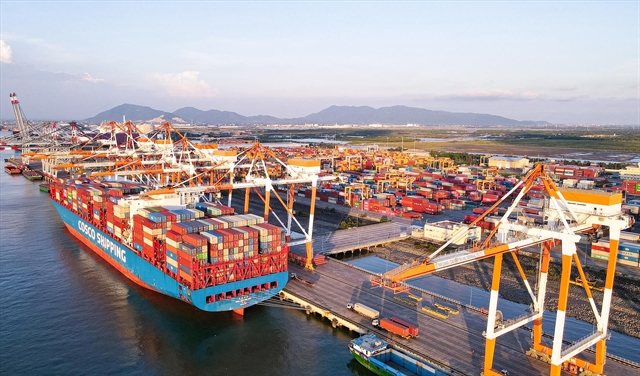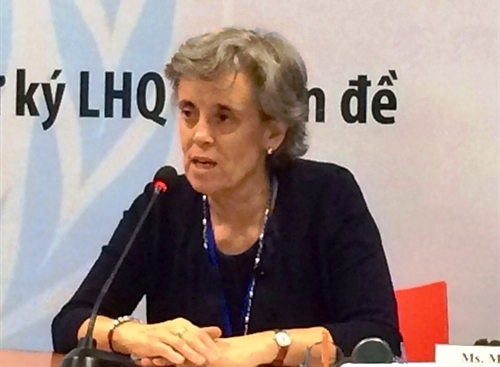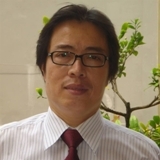 In the Spotlight
In the Spotlight

Việt Nam News reporters Thu Trang and Khánh Dương talk to youth experts and parents about how to protect children using the Internet on the occasion of Việt Nam’s Action Month for Children (June).
 |
| Marta Santos Pais, Special Representative of the United Nations Secretary-General on Violence against Children. |
The rapid spread of the Internet and mobile phones have revolutionised the way young people access information, but it has also brought a real risk of online abuse for children in Việt Nam and globally. According to United Nations Children’s Fund (UNICEF), one in three Internet users in the world is a child. The latest statistics updated by internetlivestats.com shows that Việt Nam ranks 13th among countries having the highest Internet users level with more than 49 million Internet users, 52 per cent of the whole population. Many of them are children under the age of 18. Việt Nam News reporters Thu Trang and Khánh Dương talk to youth experts and parents about how to protect children using the Internet on the occasion of Việt Nam’s Action Month for Children (June).
What potential dangers could children face online?
Marta Santos Pais, Special Representative of the United Nations Secretary-General on Violence against Children
Online abuse through the Internet, mobile phones and tablets is becoming more and more prevalent. In fact, Asia is probably the region where things are growing with the greatest speed. We are seeing children using these tools at a younger age and also using it to talk to each other, blending real life and virtual life.
One big risk is that children are so used to chatting to their friends that sometimes they believe they are chatting online to people they know, but some people who are interested in using or exploiting the child present themselves as young people, trying to take advantage of the child.
The other important risk is that unfortunately on the Internet, we have many types of information some of which is very dangerous for children. We may find information about how to do self harm, how to cut one self, how to stop eating because we want to be elegant. And children very often have access to negative information they do not realise can be negative for their health, physical and mental.
The third is that through the Internet we see people, sometimes friends posting information that may say ‘I am in this particular school’, ‘I live in this particular house’, this is the photo and information gets disseminated and it can reach thousands of people in seconds. And some people use that information to go to the door of the school and try to talk to that child and say I’m a friend of your parents or your family, I would like to take you because I will help you go home, taking advantage of the innocence of the child.
Stefan Stoyanov, Technical Expert Trafficking and Migration of Terre Des Hommes in Asia, an organisation working to stop child exploitation
I think there are two aspects when we talk about online child protection.
When we look at normal use of the Internet, what we need are children to be aware if they become victims of malicious content. If someone wants to bully them online, if someone wants to sexually harass them or ask them to do things they don’t want.
But the other aspect of child protection, of online child abuse which is the serious one is when children are being abused for commercial purposes, their abuse is broadcasted online for the use of sexual predators who are anywhere else in the world and pay to watch the abuse of that child.
 |
| Đặng Hoa Nam |
Đặng Hoa Nam, director of the Department of Child Care and Protection Department under the Ministry of Labour, Invalids and Social Affairs (MoLISA)
We should mention the two sides of the Internet. We cannot deny the benefits of the Internet for children because it is an irreplaceable means of communications. It is also an endless store of intelligence and culture which children can use for their studies.
But there are a number of risks threatening children on the internet. Children can access harmful information such as sexual violence, and furthermore become addicted to the internet and online games. Recently one more risk appeared, it is child sexual abuse in tourism. In the future, it is sure that more risks will appear.
Nguyễn Minh Hương, a mother
The quick development of information technology opened opportunities, but also created risks for users, especially children. The children can access violent or sexual content. They can be defrauded after joining online games, or after sharing their personal information on the internet.
Some bad people can entice the children to join activities that violate the law, such as working in the sex trade, transporting and trading heroin, or they can sexually abuse the children. Taking advantage of the internet to threaten and put pressure on the children will lead to serious consequences on their psychology, health and education.
In which ways can children be protected from online dangers? What are the responsibilities of parents and teachers in protecting their children?
Santos Pais:
You should never share information about where you live, where you go with friends, and never post photos that can compromise your personal information. When schools take that important role, the risks get reduced and children also learn on how to protect themselves.
Parents play a very important role too. In many societies, perhaps in rural Việt Nam, many families have never had a computer. It’s not part of their daily lives. They don’t have a mobile phone and they may not aware of the risks that their children may face or they may think I’m not going to allow my child to use the computer as a way of preventing risks from occurring, and the child tries to use the computer anyway.
So what we would like to suggest is that the school can be the place where members of the family can learn about the potential new technologies can offer. And if something goes wrong, the school can also be a bridge supporting parents and supporting the child.
We are also aware that according to a recent study conducted here in Việt Nam, around 40 per cent of the children have suffered some form of online abuse. We need to alert children about the risks but we need not frighten the child.
In Việt Nam many people have bicycles and motorcycles, and we teach children how to use the bicycles, in the same way we need to work with children on how to use the computer, the Internet and mobile phones, helping people to reduce the risks and support the potential of technology.
 |
| Stefan Stoyanov |
Stefan Stoyanov:
We need children to have the knowledge of what to do and who to call, so we need agencies to be able to respond to any concerns from children and we need to set up programs to include information about safe use of the Internet.
We also need parents to be aware of the risks on the Internet so they can monitor younger children when they use the Internet at home. There’s basic advice like putting the computer in the living room where people can see what is happening on the screen, these are basic things but very useful .
The role of government and the media in helping parents learn simple ways in which they can ensure their children are safe online is important.
Nam:
The best measure is to help children know how to use the Internet usefully, and then self-protect from being abused online. It is long-term work and needs to be done within a number of years.
Parents and schools should set up programmes on helping children improve their Internet using capacity. But at present we have a serious problem, which is that the Internet and information technology change continuously, and its usefulness also changes continuously so parents and teachers are often more behind the times than the children.
One important measure rarely mentioned, is that stricter management should be put on enterprises supplying Internet services. At a recent conference, some enterprises said that they can conduct measures to protect the children on the internet, and the problem is whether they want to do or not. So I want to emphasise that enterprises trading on the Internet are responsible for protecting the children. And the work must be regulated in laws with strong punishment for violations.
 |
Hương:
Instead of banning children from using social networks, parents should teach their children how to deal with several problems that they can encounter on the Internet. The parents should advise their children not to publish personal information on social networks, for instance their telephone number, address or email. Parents should install security software which helps discover and prevent harmful code from being downloaded onto their computers.
Parents should make sure that they can access to their children’s account and then supervise them. The children’s friends list should be checked.
If your children insert a video on YouTube, you can advise them that they should not put make the video public, which means that just some select people can see it. If your children still want to make the video public, you should tell them that you could receive bad comments.
Besides, you can tell them that all of the information they put on the Internet can affect their work in the future, for instance, when they apply to a university, or apply for a job.
To prevent your children from sharing too many photographs on the internet, you can encourage them to share their memories about their favourite books or films.
The Department of Child Care and Protection Department in cooperation with UNICEF are building a project on protecting children in the Internet environment. What is the content, target and the itinerary of this project?
Nam:
The project aims at implementing the country’s commitment at the international conference on protecting children on the internet which was organised in London in 2014. The project is scheduled to submit to the Government by the end of this year. Reasons and measures about protecting the children on the Internet are mentioned in the project.
I think that it is necessary to define priority measures, and call for more participation from enterprises.
The State acts as the vanguard in protecting the children, but the State cannot do all the work alone. The community, parents, schools and enterprises must help out too. Stronger management should be put on enterprises’ trading on the internet. State organisations must be responsible for checking and destroying harmful services for children. Comprehensive measures are the most important measures. — VNS